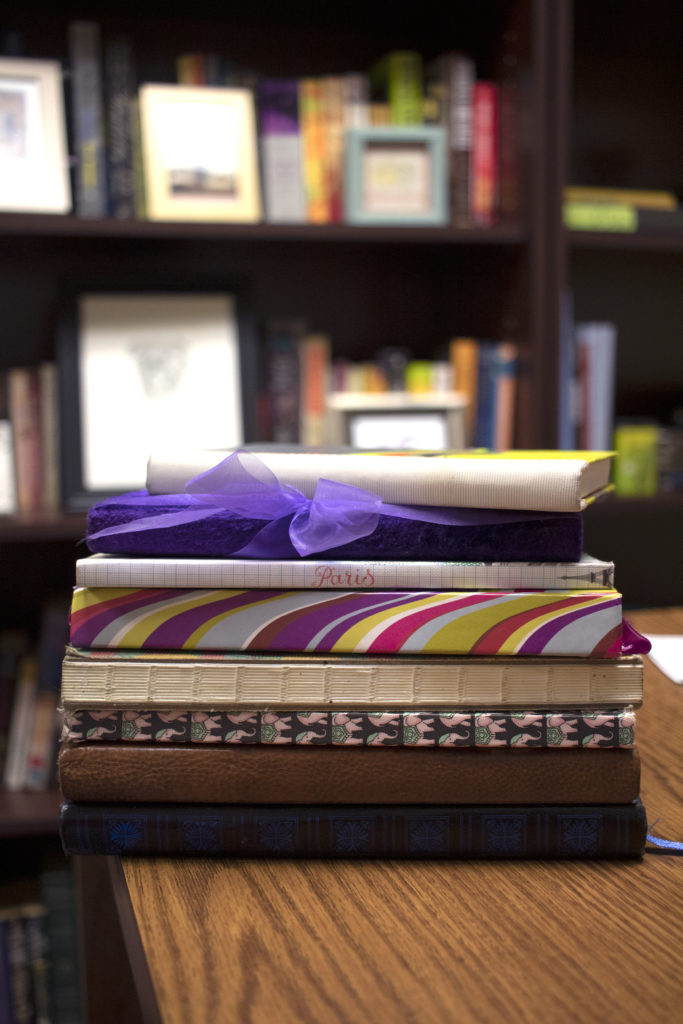Story & Photos by Camille Rasor
Daily reflection can establish a written legacy

Almost as a response to the pressure to succeed that can come from our parents, our mentors, society at large or even sometimes ourselves, the typical American adult books their calendars so full that there is little room left for self-reflection and, as a result, personal growth. Those who do try to escape the never-ending cycle of deadlines and overbooked planners do so through the simple act of daily journaling, and over the years, some people have accrued memories and records of nearly every stage of their personal story.
Dr. Nicole Kenley, a professor in Baylor’s English department who studies contemporary American fiction, has been journaling for 20 years. She began her daily diary entries in 1999 as a way to track her commitment to her New Year’s resolutions when she was 15 years old, and it quickly morphed into a way for her to process her day and the way she felt about it.
“It’s a daily process of self-reflection to think about what I’ve done well, what I have struggled with and to just process the thoughts and emotions I have at the end of the day,” Kenley said.
Over time, these daily self-reflections have added up to fill 18 books that started out with blank pages but now contains the stories of Kenley’s life.
“It really gives me an opportunity to see how I have grown and changed as a person,” Kenley said. “If I look back at some of those early journals, particularly as a high school student, I almost don’t recognize myself. But that’s part of my story. That’s part of my journey. It’s helpful to say, ‘You know, I have come a long way. I have grown a lot.’”
That same experience of looking back on personal growth through the entries in her old journals is also true for Baylor junior Madalyn Watson.
Watson has been journaling since her elementary school days. The ability to look back at what her daily life used was as a child and teenager has not only shown her how much she’s grown, but it has also helped her recognize pieces of her life that she used to enjoy. As she has gotten older she has found herself having less time for those things.
“I spent a lot of alone time in high school. I wasn’t constantly with other people, and I loved to just spend an entire day like drink my cup of coffee, eat some cookies in the morning when I shouldn’t have, read all day, maybe watch a movie and then journal until I fall asleep,” Watson said.
“That for me was a perfect day in high school, and then I found myself in college constantly surrounding myself with people. And I enjoyed it. I loved meeting new friends and everything, but looking back at my old journals actually made me realize like I do really enjoy being alone. And it’s something that I’m trying to put back into my life, having that alone time and having time to just be creative on my own.”
Both Kenley and Watson, though they are at different points in their lives, find journaling to be an effective way of understanding their life and putting the emotions into context. Sometimes, however, it can be hard to find the time or energy for them to write their thoughts down on the page.
“There are obviously times when I’m having a bad day or I’m struggling with something or my life feels like a wreck, and I don’t want to write it down because it’s so difficult, even to think about it,” Kenley said. “But even in those moments when it’s most challenging to reflect on what’s happening, I think the process can be still valuable… The times when I don’t feel like it, when I genuinely don’t want to do it, those are the times when it’s really the most important.”
This process of consistently expressing your emotions and the events of your day through journaling can have actual psychological benefits. Dr. Wade Rowatt of Baylor’s psychology and neuroscience department commented on the ways these benefits have been studied in the academic psychology field.
“Inspired by Jamie Pennebaker’s groundbreaking research at UT-Austin, dozens of research studies show small, beneficial effects of expressive writing on physical and psychological health,” Rowatt wrote in an email. “Expressive writing can reduce stress and even impact immune-system parameters.”
That stress reduction that Rowatt mentioned is something junior Baylor student Emily Stellburg experiences when she writes in her journal.
“My mind runs a million miles an hour most of the time, so being able to take the time to process through them all is seriously so helpful to me. It’s hard to explain, but I feel relieved after writing,” Stellburg wrote in a private message.
Kenley also expressed that same feeling of stress relief. In fact, if she gets too busy to write in her journal for a day or two in a row, her stress level usually elevates more than it does when she has to opportunity write about her day.
“When I don’t do it for a few days, I get a little more stressed, more frazzled,” Kenley said. “I have a little less time for self-reflection and self-care.”
Unlike Kenley and Watson, Stellburg has only been journaling for about three years now. As such, she has yet to build up a stack of journals from decades past. However, she is looking forward to the day when she will be able to reminisce on her life through her journals.
“[I started journaling at] the end of my senior year and I was starting to become nostalgic because I knew that I’d be moving away soon,” Stellburg wrote. “I wanted to preserve all the memories and feelings of my senior year and I just kept going. I know that one day I’ll look back and be so grateful for taking the time to write what all was going on in my life.”
For Kenley, journaling is a deeply personal experience, and she doesn’t ever see sharing her entries as something she would want to do.
“I’m so raw in them. I’m so concerned with getting my feeling and thoughts out rather than protecting people’s feelings or emotions, that I would be very unhappy if they got out,” Kenley said, emphasizing that these journals are for her and her alone.
However, Watson feels slightly differently about the concept of sharing her journal entries. Though she is not comfortable sharing them with the world (at least right now), she does see value in sharing them with her future children.
“I have journals in my closet in my apartment from like, when I was 8, and it’s like these short little stories and what I did at school that day, and that’s the kind of thing I would maybe want to show my kids,” Watson said.
Starting good habits like journaling, however, can often be tricky to turn into something you do consistently. Rowatt explained what steps one could take to make it easier for them to start good habits, whether that habit is journaling or something else, and why it is worthwhile to put effort into it.
“There are myriad health benefits of journaling, exercising, and processing emotions. But starting and maintaining good habits or breaking bad habits isn’t easy,” Rowatt wrote. “Wendy Wood, a social psychologist at USC who studies habits, has found that it’s most effective to simultaneously break unhealthy habits while starting healthy ones. Sometimes it helps to have a few friends or family to start the new good habit together.”
Specifically, in regard to journaling, everyone who journals and interviewed for this piece expressed the ability to look back on their lives as a big personal reward from their journaling habit.
“Re-reading all my past entries brings me back to all the emotion of the events that I’ve written about,” Stellburg wrote. “I get to see my growth, which is really cool and something that wouldn’t be so clearly seen if I didn’t journal.”
Watson echoed that same sentiment when talking about the struggles she went through when she was younger.
“[Those struggles] seemed like the end of the world when I was 16, and I was able to get through it. So whatever seems like the end of the world now, I can get through that, too,” Watson said.
Whether we acknowledge it or not, our past selves have left a legacy for our current selves of who we have been and what we have been through. That legacy informs the creation of who we will be in the future, and for some, journaling helps them to understand that legacy in a way that grows them, and in the end, shapes them into better people.

